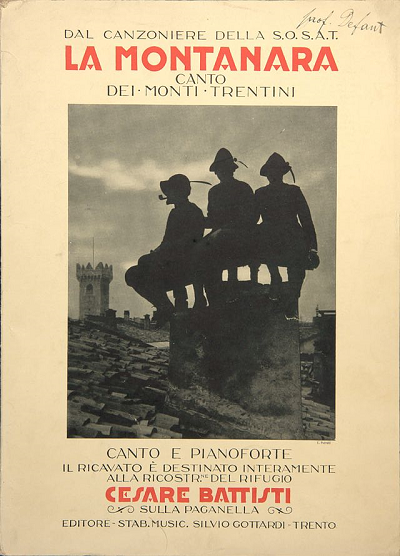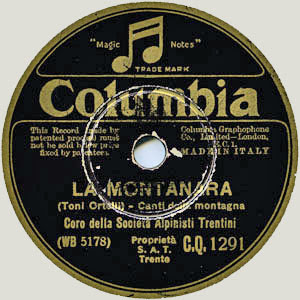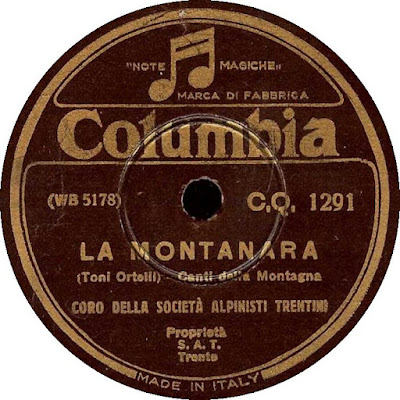"It Wasn't God Who Made Honky Tonk Angels" is a 1952 #1 country hit song written by J. D. "Jay" Miller, recorded by Kitty Wells. Originally recorded by Al Montgomery as "Did God Make Honky Tonk Angels?"
It was an answer song to the Hank Thompson hit "The Wild Side of Life", which was originally recorded by Jimmie Heap.
"The Wild Side of Life" and "It Wasn't God Who Made Honky Tonk Angels" are set to an apparently traditional tune, that was already used in Rev. Guy Smith's "The Great Speckled Bird"—popularized in 1936 by Roy Acuff, and more familiarly in the Carter Family's "I'm Thinking Tonight of My Blue Eyes" recorded in February, 1929 (originally recorded by the North Carolinba Ramblers and Roy Harvey as "Blue Eyes").
The tune is also used in an even older song "Thrills That I Can't Forget" recorded by Welby Toomey and Edgar Boaz in 1925.
But then there is the striking resemblance with "The Prisoner's Song" recorded in 1924 by Vernon Dalhart.
"The Prisoner's Song", is a song copyrighted by Vernon Dalhart in 1924 in the name of Dalhart's cousin Guy Massey, who had sung it while staying at Dalhart's home and had in turn heard it from his brother Robert Massey, who may have heard it while serving time in prison.
The Prisoner's Song rates as a 1920s all-time best-seller with a staggering seven million-plus copies sold worldwide in the version by Vernon Dalhart. The Vernon Dalhart recording charted for 32 weeks, twelve at No. 1, during 1925 and 1926. The Vernon Dalhart version was recorded on Victor Records in October 1924 and marketed in the hillbilly music genre. It became one of the best-selling records of the early twentieth century, with at least two million copies sold (sales figures are uncertain; some place the sales at 7 million or more), as well as over a million copies of the sheet music to the tune.
Long-lasting controversy over the authorship of the song quickly arose. Dalhart copyrighted the song in Guy Massey's name, taking 95% of the author royalties for himself and giving Massey 5%.
Nat Shilkret, A&R man for Victor's newly established Country Records Department, protested, claiming that the song as Dalhart had brought it to him was unusable, and that he rewrote the music. The Shilkret family fought unsuccessfully through the 1950s for author credit.
Guy Massey had heard the song from his brother Rob Massey, who had actually spent some time in prison and probably first heard the song there. Palmer cites a letter dated October 20, 1924 from Guy Massey to his brother Rob Massey and two of his sisters telling them that he agreed to a 5% stake in royalties because he thought there would not be any royalties. Guy also said that, even though the royalty contract did not mention Rob explicitly, he (Guy) would split the 5% evenly with Rob. Although Dalhart changed his story frequently when he told it in public, he sometimes also claimed to have rewritten the original that he got from Guy. At times there were claims made that Guy had written it and there were claims that Rob had written it. Another story claims the lyrics were carved into the wall of a cell in the old Early County Jail in Blakely, Georgia by Robert F. Taylor, who was at one time held there. The Prisoner's Song - Wikipedia
Maybe Guy (or Rob) Massey got the inspiration from an English song, that became popular in America near the beginning of the 19th c, printed in sheet music and arranged in America for duet in 1812: "Meet Me By Moonlight Alone". They literally copied one verse from that song
This song for lovers meeting by moonlight, has persisted as a floater in other songs. The original poem, by J. Augustine Wade, London, can be found as broadside NLScotland, L.C.Fol.70(83b) "Meet Me by Moonlight Alone," Poet's Box (Dundee), n.d.
The original song, by J. Augustine Wade, London, undated in Levy, was arranged for duet in an 1812 copy printed in Philadelphia and composed by Mrs. Seguin and Mr. Shrival.
Listen here to a version from 1907.
(o) Herbert Witherspoon and Victor Orchestra (1907)
Recorded June 13, 1907 in Philadelphia, Pennsylvania
Released on Victor 74071
Lyrics
Meet me by moonlight alone
And then I will tell you a tale.
Must be told by the moonlight alone
In the grove at the end of the vale.
You must promise to come, for I said
I would show the night flowers their Queen
Nay turn not away that sweet head-
'Tis the loveliest ever was seen.
Oh! meet me by moonlight alone
Meet me by moonlight alone.
Daylight may do for the gay-
The thoughtless, the heartless, the free-
But there's something about the moon's ray
That is sweeter to you and to me-
Oh! remember, be sure to be there,
For tho' dearly a moonlight I prize,
I care not for all in the air,
If I want the sweet light of your eyes.
So meet me by moonlight alone,
Met me by moonlight alone.
Listen here: cusb_victor_74071_01_c4587_01.wav
As you can hear the tune is not the familiar one used in "The Prisoner's Song", but they copied the "Meet Me By Moonlight Alone" verse.
But according to Frank C. Brown, all the verses in "The Prisoner's Song" were taken from several earlier sources.
Here's "The Prisoner's Song" with a.o. the "Meet Me By Moonlight Alone" verse.
(o) Vernon Dalhart (1924) (as "Prisoner's Song")
Vernon Dalhart, v; Acc. Lou Raderman, viola; Carson Robison, g;
Recorded in New York on August 13, 1924
Released on Victor 19427
Lyrics (with the "Meet Me By Moonlight Alone" verse mentioned above)
Oh, I wish I had someone to love me,Someone to call me their own.Oh, I wish I had someone to live with'Cause I'm tired of livin' alone.Oh, please meet me tonight in the moonlight,Please meet me tonight all alone,For I have a sad story to tell you,It's a story that's never been told.I'll be carried to the new jail tomorrow,Leaving my poor darling alone,With the cold prison bars all around meAnd my head on a pillow of stone.Now I have a grand ship on the ocean,All mounted with silver and gold,And before my poor darlin' would suffer,Oh, that ship would be anchored and sold.Now if I had the wings of an angelOver these prison walls I would fly,And I'd fly to the arms of my poor darlin',And there I'd be willing to die.
Or here:
(c) Vernon Dalhart (1924) ("Prisoner's Song")
Recorded October 1924
Released on Perfect 12164
Listen here:
(c) Vernon Dalhart (1925) ("Prisoner's Song")
Recorded March 1925
Released on Cameo 703
Listen here:
(c) Welby Toomey and Edgar Boaz (1925) (as "Thrills That I Can't Forget")
Welby Toomey, v; acc. Edgar Boaz, g.
Recorded November 13, 1925 in Richmond, IN
Released on Gennett 3228
Also released on Challenge 159 (with alias-name John Ferguson)
Listen here: welby-toomey-thrill-i-cant-forget-cr2.mp3
Or here:
More than a year before the Carter Family recorded "I'm Thinking Tonight of My Blue Eyes"
the North Carolina Ramblers & Roy Harvey recorded the very similar "Blue Eyes"
Moreover they also included the "Meet Me By Moonlight Alone" verse.
(c) North Carolina Ramblers & Roy Harvey (1927) (as "Blue Eyes")
Posey Rorer, f; Bob Hoke, bj-md/v; Roy Harvey, g/v.
Recorded in Chicago, IL October 1927
Matrix 20089-2
Released on Paramount 3072 and Broadway 8158
Broadway 8158 as by Wilson Ramblers
Listen here:
Or here:
(c) Carter Family (1929) (as "I'm Thinking Tonight of My Blue Eyes")
Carter Family (Sara Carter [vcl/autoharp], A.P. Carter
[vcl], Maybelle Carter [vcl/gt])
Recorded February 14, 1929 in Camden, NJ
Released on Victor V-40089, Bluebird B-5122 and Montgomery Ward M-4230
Listen here:
But already one year before the Carter Family recorded "Meet Me by Moonlight Alone", which has not the familiar tune, but almost the same lyrics as "The Prisoner's Song"
(c) Carter Family (1928) ("Meet Me by Moonlight Alone")
Recorded May 9, 1928 in Camden, New Jersey
Released on Victor 23731
Lyrics:
I'm going to the new jail tomorrow
To leave the one that I love
To leave my friends and relations
And, oh, how lonely, my love
Chorus:
Meet me by the moonlight, love, meet me
Meet me by the moonlight alone
For I have a sad story to tell you
To be told by the moonlight alone
My parents, how cruel they treat me
They drive me away from their door
If I live a hundred years longer
I'll never go back any more
Chorus
If I had a ship on the ocean
All laden and lined with pure gold
Before my darling should suffer
I'd have that ship anchored and sold
Chorus
If I had the wings of an angel
O'er land and sea I'd fly
I'd fly to the arms of my darling
And I'd be willing to die
Chorus
Listen here:
(c) Roy Acuff and his Crazy Tennesseeans (1936) (as "Great Speckle Bird")
20 October 1936 Furniture Mart Building, 666 Lake Shore Drive, Chicago, IL - Roy Acuff & His Crazy Tennesseans (Jess Easterday [gt], Clell Sumne [dobro], Red Jones [bass], Sam Hatcher [harmonica]. Producer: William Callaway)
Released in January 1937 on Melotone (#7-01-59) and Conqueror (#8740)
Re-released on Vocalion / Okeh 04252 in August 1938
Re-released on Columbia 37005 in 1946
Listen here:
Roy Acuff first recorded "Great Speckle Bird" in 1936 and continued to perform it regularly on the Grand Ole Opry. It quickly became one of the most famous songs in country music. It was based on a verse from the King James Bible (Jeremiah 12:9 Ð "Mine heritage is unto me as a speckled bird, the birds round about are against her;"). Interpreted as a description of the persecution experienced by the church, the verse, set to a traditional tune, soon gave rise to a Pentecostal anthem.
Acuff first heard the song sung in 1936 in Knoxville, Tennessee sung by a gospel group called the Black Shirts. After paying fifty cents to the leader of the Black Shirts, Charlie Swain, for a copy of the song, he immediately began to perform his own version of it and his radio performance landed him his first record contract.
Others say "Great Speckle Bird" was written about 1934 by a radio entertainer of Springfield, MO., known as "Uncle George", whose real name was Guy Smith.
One text was printed anonymously in the Aurora (Mo.) Advertiser, March 16, 1936.
Another version was copyrighted in 1937 by the M.M. Cole Publ. Co. of Chicago, with the words credited to Rev Guy Smith and the music to Roy Acuff.
(c) Jimmie Heap & The Melody Masters (1951) (as "Wild Side Of Life")
Jimmie Heap [ld gt], Perk Williams [vcl-1/fiddle],Horace Barnett [rh gt], Butterball Haris[steel], Bill Glendening [bass], Arlie Carter [piano]
Recorded ca February 1951 Peterson's Studio, Austin, TX -
Matrix IF-258
Released on Imperial 8105
Listen here:
Jimmy Heap and His Melody Masters first recorded "Wild Side" in 1951, but never had a hit with the song.
Hank Thompson did, and his version spent three and one-half months atop the Billboard country chart in the spring and early summer of 1952.
(c) Hank Thompson and His Brazos Valley Boys (1952) (as "The Wild Side Of Life")
Hank Thompson (Hank Thompson [vcl/gt], Billy Gray [gt/leader], Curly Chalker [steel], Billy Briggs Stewart [bass], William Wayne Foster [drums], Joe Herman „Big Red“ Hayes [fiddle], Kenneth Allen „Little Red“Hayes [fiddle], Gilbert „Gil“ Baca [piano]. Producer: Dee Kilpatrick)
Recorded December 11, 1951, Capitol Recording Studio, 5515 Melrose Ave., Hollywood, CA
Released January 1952 on Capitol #1942
Listen here:
(c) Al Montgomery (1952) (as "Did God Make Honky Tonk Angels")
Released on Feature Records 1036
Listen here:
(c) Kitty Wells (1952) (as "It Wasn't God Who Made Honky Tonk Angels")
(Kitty Wells [vcl], Joseph Zinkan [harm vcl], Eddie Hill [gt/harm vcl], Shot Jackson [steel], Johnny Wright [bass], Dorris Warren [fiddle]. Producer: Paul Cohen)
Recorded May 3, 1952 Castle Studio, The Tulane Hotel, 206 8th Ave. North, Nashville, TN –
Matrix 82830
Released June 1952 on Decca 28232
Listen here:
Burl Ives had a top 10 hit with "Wild Side Of Life" concurrent with Hank Thompson's No 1 hit.
Tommy Quickly & The Remo Four (1964) (as Wild Side Of Life) (No. 33 UK Chart),
Freddy Fender reached No. 13 on the Billboard Hot Country Singles chart in early 1976.
A version by the British rock band Status Quo reached the UK top 10 in 1976.
In the same year Rod Stewart recorded a version for his album "A Night On The Town".
(c) Marianne Faithfull (1978) (as "Honky Tonk Angels")
(c) David Allan Coe (1977) (incorporated in "If That Ain't Country")
David Allan Coe mentions all the titles at the end of his If That Ain't Country.
An' I'm thinkin' tonight of my blue eyes,
And flyin' with the great speckled bird.
I didn't know God made honky-tonk angels
And went back to the wild side of life.
Listen here:
In 1981, "Wild Side" and "It Wasn't God ..." were combined into a duet by Waylon Jennings and Jessi Colter on their album Leather and Lace; that version reached No. 10.
Kris Kristofferson also uses fragments of "Wild Side Of Life" in his "Blessing In Disguise" and "The Devil To Pay" (both '81)
More versions here:









































